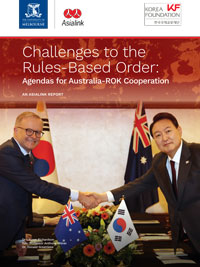This Asialink/Korean Institute report, co-edited by AEI Visiting Professor Anthony Milner, argues for far greater Australia-South Korea collaboration - especially in providing powerful support for ASEAN's inclusive regionalism. The Southeast Asian dimension of this report draws upon a research project on Australia-ROK-ASEAN initiated by Professor Lee Poh Ping, Dr. Hyung Jong Kim and Professor Milner. That project was not completed, partly because of the tragic death of Professor Lee.
The authors of this report express thanks for the assistance of AEI Deputy Executive Director, Dr Nurliana Kamaruddin - and also stress the importance of the book she and others wrote: Navigating Uncharted Waters: Security Cooperation between ROK and ASEAN (eds. Andrew Mantong and Muhammad Waffaa Kharisma).
In launching the Asialink/Korean Institute report on 2 May, former Australian Foreign Minister and Chancellor of the Australian National University, Gareth Evans, called it a "credit to Asialink and the Korea Foundation". He said it is "well-researched, well-argued, well-written and well-presented" and will "make an important continuing contribution to the policy debate".
This report has been prepared for Asialink, University of Melbourne (in cooperation with the Australian Committee of the Council for Security Cooperation in the Asia Pacific) and was funded primarily by the Korea Foundation. Its website can be found here.
This report has been prepared for Asialink, University of Melbourne, in cooperation with the Australian Committee of the Council for Security Cooperation in the Asia Pacific. It explores the potential for collaboration between Australia and the Republic of Korea (ROK), on the development of the Rules-Based Order (RBO) and the institutional architecture underpinning it. The report was primarily funded by the Korea Foundation and was authored by Lauren Richardson, with Anthony Milner as the Project Director and Editor and Donald Greenlees as the Editor.
The research team would like to thank Peter Drysdale from the Australian National University for his substantial contribution to the report section inAgenda 1, as well as other colleagues who provided valuable feedback on various sections of the report. Thanks go in particular to Kyung Moon Hwang, Peter Lee, Shiro Armstrong, Nurliana Binti Kamaruddin, and Colin Heseltine for their feedback and support, as well as Jaehyon Lee for facilitating interviews in Seoul and Mina Lee for translating the Key Findings and Recommendations. We are also grateful to the many interviewees whose views informed this report and to Professor Kim Heungkyu of Ajou University for his invaluable support with the Korea Foundation grant application. The ANU Korea Institute generously co-hosted the report launch, which was organized by Grace Corcoran. Lachlan Phipps and Kansiree Sittipoonaegkapat provided assistance in photo archive research. Finally, the Project team would like to thank Asialink CEO Martine Letts and former CEO Jenny McGregor for their support of this work, as well as the Korea Foundation for generously providing funding.
The Australia-ROK relationship is often characterized as "under-cultivated" due to a divergence in strategic outlooks and foreign policy priorities. However, the fact that both countries have shifted to an Indo-Pacific regional policy paradigm provides a logical basis for cooperation. This report takes seriously the differences between Australia and the ROK and suggests that these differences make cooperation more valuable, rather than less. To advance concrete action, the report identifies three agendas through which Australia and the ROK could cooperate in reinforcing or revitalizing the RBO, based on a convergence of interests, niche diplomacy capabilities, and foreign policy priorities.
In conclusion, by working collaboratively with ASEAN on rules issues, Australia and the ROK would have an opportunity to strengthen middle-power agency in international rulemaking, helping them in the search for international consensus. Such a partnership could enhance Australian and ROK global influence and provide added endorsement for inclusive institutions at the same time. This is especially valuable today when great power rivalry is doing such damage to the optimistic region-building of the early post-Cold War era.

Last Update: 11/05/2023